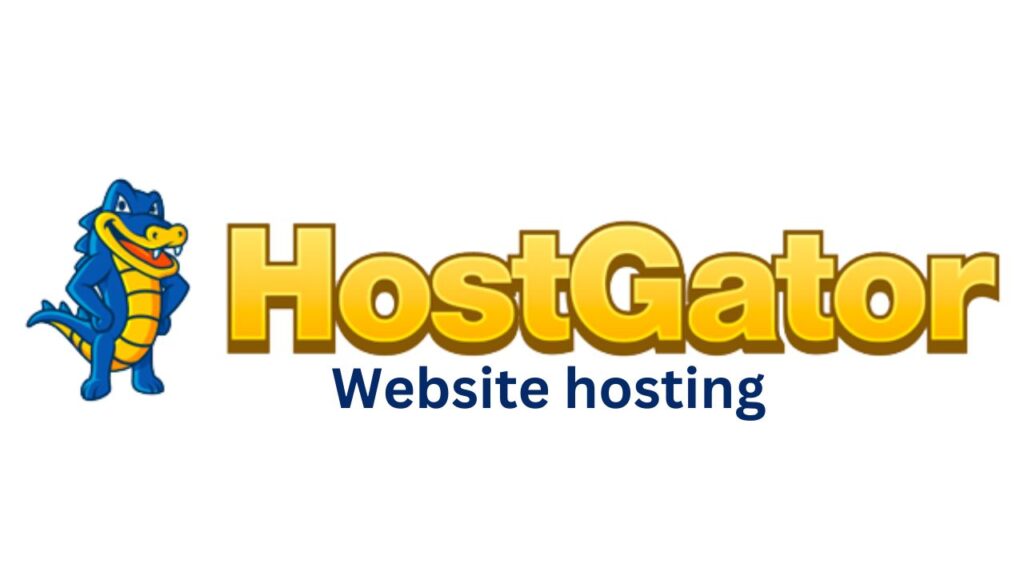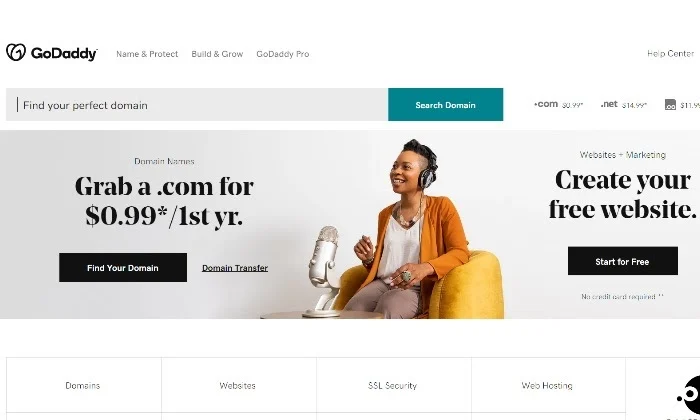Introduction: Exploring Leading Web Hosting Services
In the ever-evolving digital landscape of 2023, choosing the right web hosting service can significantly impact the success of your online venture. To guide you through this crucial decision-making process, we’ve carefully selected and scrutinized four prominent web hosting giants: Bluehost, HostGator, GoDaddy, and SiteGround. In the pages that follow, we’ll provide you with an in-depth analysis of each of these hosting providers, laying out their pros and cons for your consideration. From reliability to customer support and performance, this comprehensive breakdown will equip you with the knowledge you need to make an informed choice for your website’s hosting needs. Let’s dive into the details of these industry leaders and uncover the advantages and considerations they bring to the table.
1. Bluehost

Bluehost: Empowering Your Online Presence
Bluehost is a well-established web hosting platform that has gained popularity for its combination of reliability, user-friendly features, and excellent customer support. With a focus on catering to both beginners and experienced users, Bluehost offers a range of hosting services, making it a versatile choice for various types of websites.
Pros:
- Excellent Uptime: Bluehost is known for its impressive uptime, ensuring that your website remains accessible to users around the clock.
- User-Friendly Interface: The platform’s intuitive control panel makes it easy to manage your hosting settings, install applications, and navigate your hosting account.
- One-Click WordPress Installation: For those using WordPress, Bluehost offers a seamless one-click installation process that gets your site up and running quickly.
- Free Domain: Bluehost provides a free domain name for the first year with its hosting plans, which is a cost-effective advantage for those just starting out.
- 24/7 Customer Support: Whether you’re troubleshooting technical issues or have questions, Bluehost’s round-the-clock customer support is available to assist you.
Cons:
- Higher Renewal Prices: While Bluehost’s introductory prices are competitive, keep in mind that renewal rates tend to be higher after the initial term.
- Basic Plan Limitations: The entry-level plan might lack some advanced features that more experienced users or growing websites could require.
Who Is Bluehost Best For? Bluehost is an ideal choice for beginners and small to medium-sized businesses looking for reliable hosting with user-friendly features. If you’re planning to create a WordPress website, Bluehost’s one-click installation and compatibility with the platform make it a seamless choice. Additionally, if you value accessible customer support and a hassle-free setup process, Bluehost could be a great fit.
Whether you’re setting up a personal blog, an e-commerce site, or a portfolio website, Bluehost’s reputation for reliability and its beginner-friendly approach make it a platform worth considering to kick-start your online presence. Just be sure to factor in the potential higher renewal prices when planning your budget for the long term.
2. Hostgator
HostGator: Hosting Made Flexible and Accessible

HostGator is a prominent web hosting platform recognized for its flexibility in offering a range of hosting plans suited to different user needs. With a focus on simplicity and a commitment to empowering website owners, HostGator has established itself as a go-to choice for both beginners and experienced users seeking reliable hosting services.
Pros:
- Versatility in Plans: HostGator offers a variety of hosting plans, from shared hosting to dedicated servers, allowing users to choose a solution that aligns with their website’s requirements.
- One-Click WordPress Installation: If you’re planning to build a WordPress website, HostGator simplifies the process with a one-click installation option, getting you started quickly.
- Unlimited Bandwidth: Many of HostGator’s plans feature unmetered bandwidth, enabling your website to accommodate traffic spikes without additional costs.
- User-Friendly Interface: HostGator’s control panel is designed to be user-friendly, making it easy for beginners to manage their hosting settings and website.
Cons:
- Mixed Customer Support Reviews: While HostGator does offer customer support, some users have reported mixed experiences with the responsiveness and effectiveness of the support team.
- Renewal Rates: As with many hosting providers, renewal rates for HostGator can be higher than the introductory pricing, so it’s important to consider the long-term costs.
Who Is HostGator Best For? HostGator is an excellent choice for individuals, bloggers, and small to medium-sized businesses looking for flexibility in hosting plans. If you’re seeking a hassle-free setup process and the ability to scale your hosting as your website grows, HostGator’s range of plans can cater to your needs. Additionally, if you’re drawn to the simplicity of one-click WordPress installations, HostGator can be a valuable partner in launching your website.
Whether you’re a beginner taking your first steps into the world of website ownership or an experienced user seeking adaptable hosting solutions, HostGator’s diverse range of plans and commitment to user empowerment make it a platform worth considering. Keep in mind the potential variations in customer support experiences and be prepared for renewal rates when evaluating your hosting options.
3. GoDaddy
GoDaddy: Empowering Web Presence with Versatility

GoDaddy is a well-known name in the web hosting industry, recognized for its wide array of services that cater to individuals, businesses, and entrepreneurs seeking to establish their online presence. Offering everything from domain registration to website hosting, GoDaddy positions itself as a one-stop shop for various online needs.
Pros:
- Comprehensive Services: GoDaddy offers a comprehensive suite of services, including domain registration, website hosting, website building tools, and more, making it a convenient choice for those looking to manage multiple aspects of their online presence in one place.
- User-Friendly Website Builder: GoDaddy provides an easy-to-use website builder, which is especially beneficial for beginners who want to create a website without delving into technical complexities.
- 24/7 Customer Support: With round-the-clock customer support, GoDaddy ensures that assistance is available whenever you need it, which can be particularly valuable for troubleshooting and resolving issues.
- Domain Availability: GoDaddy’s domain search and registration process makes it simple to find and secure the perfect domain name for your website.
Cons:
- Upselling and Advertisements: Some users have reported that GoDaddy’s interface can be aggressive with upselling additional products and services, which may be overwhelming for some.
- Performance: While GoDaddy offers a variety of hosting plans, some users have experienced mixed performance results, with occasional complaints about site speed and uptime.
Who Is GoDaddy Best For? GoDaddy is suitable for individuals, small businesses, and entrepreneurs who want a simplified and comprehensive approach to managing their online presence. If you’re looking for an all-in-one solution that includes domain registration, website hosting, and website building tools, GoDaddy can streamline the process for you. Additionally, if you’re new to website creation and prefer a user-friendly interface, GoDaddy’s website builder can be a valuable asset.
Whether you’re launching a personal blog, an e-commerce store, or a portfolio website, GoDaddy’s versatile range of services and commitment to round-the-clock support can provide you with the tools and resources you need to succeed online. Just be aware of the potential upselling and ensure that the performance of your chosen hosting plan meets your website’s requirements.
4. SiteGround
SiteGround: Elevating Web Hosting Excellence

SiteGround stands out in the web hosting landscape with its focus on delivering exceptional performance, top-notch customer support, and a user-friendly experience. Catering to a wide range of website needs, SiteGround has gained a reputation for reliability and innovation, making it a preferred choice for many website owners.
Pros:
- Great Performance: SiteGround is renowned for its impressive loading speeds and uptime, ensuring that your website delivers a seamless experience to visitors.
- Solid Customer Support: The company is known for its responsive and knowledgeable customer support team, ready to assist you with technical queries or troubleshooting.
- Free Daily Backups: SiteGround offers free daily backups, giving you added peace of mind by safeguarding your website’s data.
- User-Friendly Experience: SiteGround’s user interface is designed to be intuitive and beginner-friendly, making it easy to manage your hosting settings and website.
Cons:
- Limited Storage on Lower-Tier Plans: Some of SiteGround’s lower-tier plans might have limitations on storage, which could be a consideration for websites that require more space.
- Higher Renewal Rates: While SiteGround’s initial pricing is competitive, renewal rates can be higher after the initial term, so it’s important to plan for long-term costs.
Who Is SiteGround Best For? SiteGround is an excellent choice for individuals, small businesses, and website owners who prioritize high performance and responsive customer support. If you’re seeking a hosting provider that offers reliability and speed, SiteGround’s track record in these areas makes it a strong contender. Additionally, if you’re looking for a user-friendly experience and value-added features like free daily backups, SiteGround can be an ideal partner in managing your website.
Whether you’re launching a personal blog, an online store, or a professional portfolio, SiteGround’s commitment to performance, support, and user experience can contribute to a positive online journey. Just keep in mind potential storage limitations on lower-tier plans and budget for potential renewal rate adjustments when evaluating your hosting options.
Conclusion: Making Your Hosting Choice
As the digital landscape continues to expand, the importance of selecting the right web hosting service becomes more pronounced than ever. We’ve delved into the features, strengths, and potential drawbacks of four prominent hosting providers—Bluehost, HostGator, GoDaddy, and SiteGround. Armed with this knowledge, you’re better equipped to make an informed decision that aligns with your website’s unique requirements and goals.
Whether you prioritize user-friendly interfaces, exceptional performance, comprehensive service suites, or top-tier customer support, each of these providers offers a distinct blend of advantages. By considering your website’s needs, growth potential, and budget, you can confidently embark on your web hosting journey, knowing that your choice is grounded in careful evaluation.
Remember that the hosting provider you select is the foundation upon which your online presence is built. With this insight into the pros and cons of these industry leaders, you’re poised to make a choice that sets your website up for success in the dynamic online realm of 2023 and beyond.